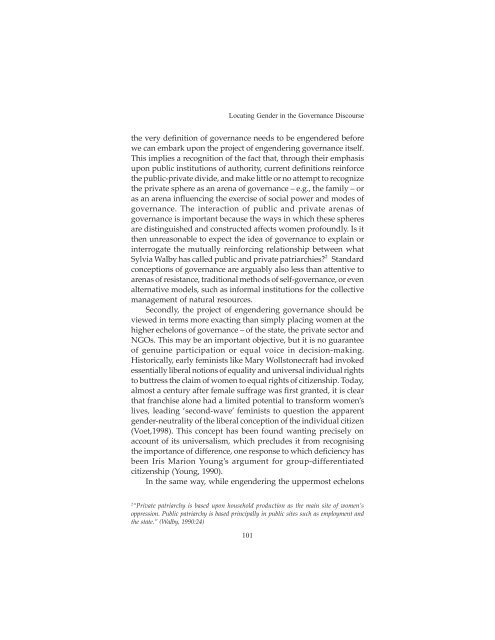Essays On Gender And Governance - United Nations Development ...
Essays On Gender And Governance - United Nations Development ...
Essays On Gender And Governance - United Nations Development ...
Create successful ePaper yourself
Turn your PDF publications into a flip-book with our unique Google optimized e-Paper software.
Locating <strong>Gender</strong> in the <strong>Governance</strong> Discourse<br />
the very definition of governance needs to be engendered before<br />
we can embark upon the project of engendering governance itself.<br />
This implies a recognition of the fact that, through their emphasis<br />
upon public institutions of authority, current definitions reinforce<br />
the public-private divide, and make little or no attempt to recognize<br />
the private sphere as an arena of governance – e.g., the family – or<br />
as an arena influencing the exercise of social power and modes of<br />
governance. The interaction of public and private arenas of<br />
governance is important because the ways in which these spheres<br />
are distinguished and constructed affects women profoundly. Is it<br />
then unreasonable to expect the idea of governance to explain or<br />
interrogate the mutually reinforcing relationship between what<br />
Sylvia Walby has called public and private patriarchies? 2 Standard<br />
conceptions of governance are arguably also less than attentive to<br />
arenas of resistance, traditional methods of self-governance, or even<br />
alternative models, such as informal institutions for the collective<br />
management of natural resources.<br />
Secondly, the project of engendering governance should be<br />
viewed in terms more exacting than simply placing women at the<br />
higher echelons of governance – of the state, the private sector and<br />
NGOs. This may be an important objective, but it is no guarantee<br />
of genuine participation or equal voice in decision-making.<br />
Historically, early feminists like Mary Wollstonecraft had invoked<br />
essentially liberal notions of equality and universal individual rights<br />
to buttress the claim of women to equal rights of citizenship. Today,<br />
almost a century after female suffrage was first granted, it is clear<br />
that franchise alone had a limited potential to transform women’s<br />
lives, leading ‘second-wave’ feminists to question the apparent<br />
gender-neutrality of the liberal conception of the individual citizen<br />
(Voet,1998). This concept has been found wanting precisely on<br />
account of its universalism, which precludes it from recognising<br />
the importance of difference, one response to which deficiency has<br />
been Iris Marion Young’s argument for group-differentiated<br />
citizenship (Young, 1990).<br />
In the same way, while engendering the uppermost echelons<br />
2<br />
“Private patriarchy is based upon household production as the main site of women’s<br />
oppression. Public patriarchy is based principally in public sites such as employment and<br />
the state.” (Walby, 1990:24)<br />
101

















